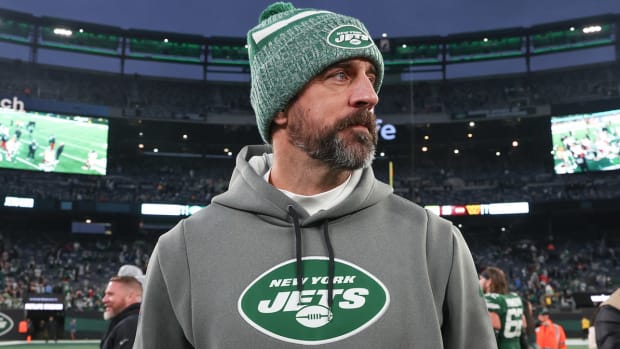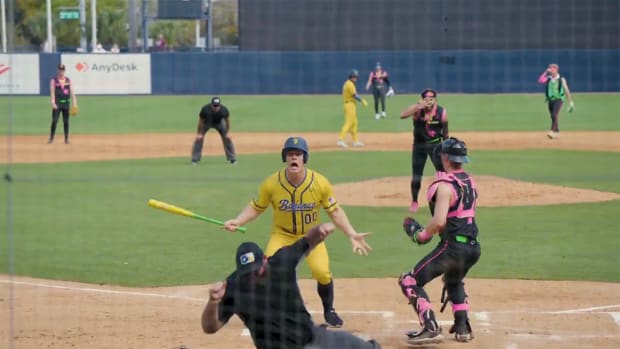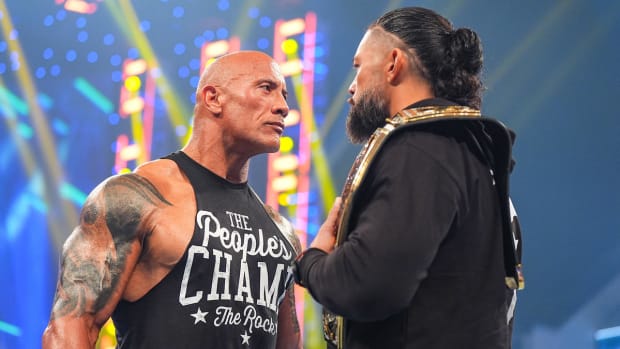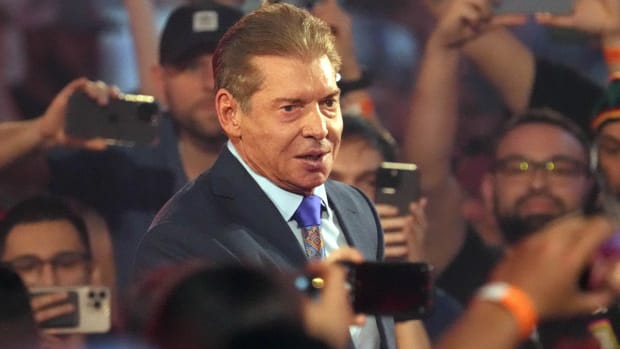Is WWE Essential?
On Monday morning, wrestling legend Jerry “The King” Lawler posted a (since-deleted) selfie on Twitter showing him on a plane wearing a surgical mask.
“Not many people flying today!” the WWE broadcaster wrote.
But Lawler, a 70-year-old with a history of health problems (including a 2012 heart attack that occurred live on the air on Raw and a 2018 stroke suffered while having sex with his girlfriend), needed to get from Memphis to Orlando because Raw was set to be broadcast live from the WWE training facility there that night—after the state of Florida had deemed WWE to be an “essential service.”
While people across the globe are being ordered to stay at home, WWE is flying performers in from around the country to grapple, punch, powerbomb and get in each other’s faces for the sake of a TV show. And it got Florida Governor Ron DeSantis’s blessing to do so.
But is WWE—a touring company that does not frequently hold events in Florida—actually essential to the state?
“I think that’s silly,” says John Solow, an economics professor at the University of Central Florida. “There are other things that are far more critical to the Florida economy.”
“Filming WWE stuff does not employ a lot of Floridians,” he says, especially when it’s being done without fans. “Even with audiences, I’m not sure it creates the sort of job numbers and employment numbers to be critical to the GDP of Florida. It’s hard to buy that.”
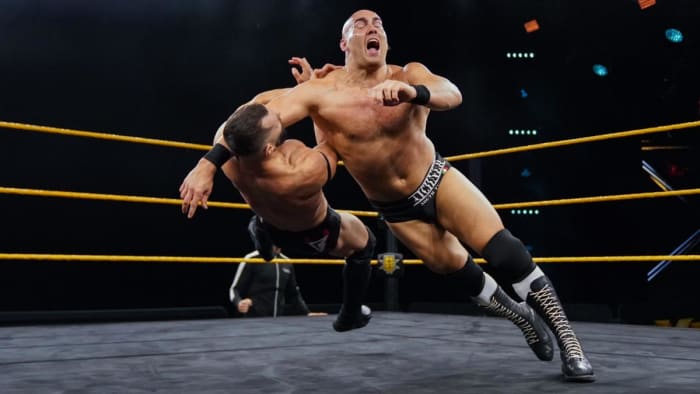
Fabian Aichner dropped a lariat on Finn Balor live on WWE's 'NXT' on Wednesday night.
Courtesy of WWE
At a time when Florida—like most states—has deemed even bookstores and barbershops too dangerous to operate, medical experts say that producing live wrestling shows could damage efforts to halt the spread of COVID-19.
“There is an issue of bringing in people from other parts of the country in order to do some of this filming,” says Dr. Cindy Prins, an epidemiologist at the University of Florida.
A particular community could be doing a good job of containing the virus and reducing the number of cases, she explains, only to have that progress reversed by an outsider's bringing the virus in. Not only could more people be infected because of the WWE’s decision, Prins adds, but medical resources could also become even more strained.
“Every time someone gets infected, someone has got to manage their symptoms. You have health care that needs to get involved,” she says. “You have the Department of Health that gets involved because they have to find all the people that they were in contact with. It adds to an overall burden of trying to deal with COVID-19.”
The decision by DeSantis on April 9—which did not become public until April 13—to reclassify, per a memo from his office, “employees at a professional sports and media production with a national audience” as essential, and therefore able to go to work, came just after WWE’s stock of taped material had been exhausted and the day before it needed to film an episode of Friday Night SmackDown to satisfy its $1 billion contract with Fox. It also came as WWE chairman Vince McMahon and his company faced dire economic circumstances: the XFL, which both McMahon and WWE were substantial shareholders in, had just declared bankruptcy, and WWE was days from announcing that it would furlough some employees and cut ties with 21 on-screen performers, including fan favorites like Rusev and Hall of Fame wrestler turned producer Kurt Angle.
The decision also came the day after America First Action, a pro–President Donald Trump super PAC run by McMahon’s wife, former Trump cabinet member Linda McMahon, announced it had committed to spend $18.5 million on broadcast advertising in Florida ahead of the November election, a decision that could have down-ballot benefits for DeSantis, a Republican, and his party.
McMahon has long been tight with Trump, even working the former Apprentice star into a story line that culminated at WrestleMania 23 in 2007. That same year, WWE donated $4 million to the Trump Foundation. This week, Trump selected McMahon to an advisory panel the president said he will consult on re-opening the economy.
DeSantis is also closely allied with Trump, who has pushed both for an expedited re-starting of the economy and for pro sports to return “sooner rather than later,” despite warnings from medical experts. (WWE and DeSantis’s office both did not respond to request for comment.)
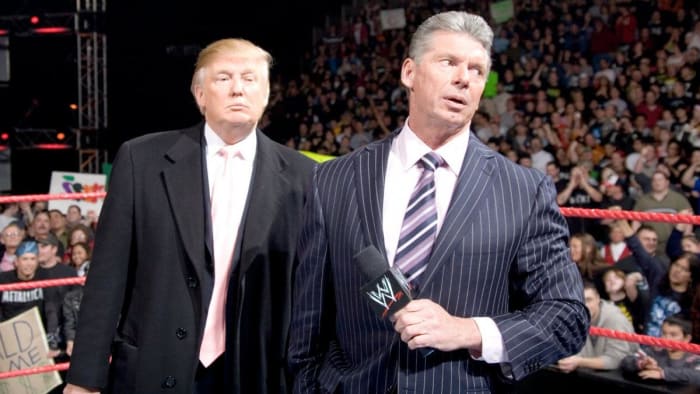
The McMahons have been close with Trump for years. In 2007, Trump appeared with Vince at WrestleMania and, as president, he tabbed Linda to join his cabinet.
Courtesy of WWE
DeSantis’s memo, which stipulates that events be held without an audience, presumably opens the door for other sports to be played in Florida (like MLB’s reported plan to host games at spring training sites) but only WWE acted immediately to take advantage of the governor’s decision. WWE announced Saturday that it intended to resume live broadcasts of its three weekly programs (Raw, NXT and SmackDown) beginning on Monday and has so far aired two shows, with SmackDown set to air Friday night.
The announcement of live shows came the same day that the company confirmed an on-screen, nonwrestler employee present at last month’s WrestleMania tapings had tested positive for COVID-19, raising further questions about whether it is safe for WWE to begin production.
McMahon’s company insists that it is taking the necessary precautions, but those steps are not enough to prevent added risk, experts say. Jay Wolfson, a professor of public health at the University of South Florida, says the issue is about much more than just the health of wrestlers or WWE employees. He likens it to riding a motorcycle without a helmet. Riders can choose whether or not to do so, but if they get in an accident, their choice can become a burden to the public.
“There’s no safe environment from this [virus], and we’re all exposed to relative risk,” he says. “I guess the national argument at this point is, at what point do we harm the long-term foundation of our economy?”
DeSantis initially said that the health of the economy was why he paved the way for WWE to resume. Sports and media workers were added to the essential services list because their work is “critical to Florida's economy,” a spokesperson for the governor’s office told ESPN.
That status became public early this week, only after reporters asked Jerry Demings, the mayor of Orange County, where Orlando is located, how the company was allowed to still be operating. Demings said it was his understanding that WWE had directly spoken with the governor’s office to receive its exemption.
“I think initially there was a review that was done and they were not initially deemed an essential business,” Demings said. “With some conversation with the governor’s office regarding the governor’s order, they were deemed an essential business. Therefore, they were allowed to remain open.”
Speaking at a press conference on Tuesday, DeSantis offered another explanation for the decision: People stuck inside during the pandemic need something new to watch on TV.
“I do think we need to support content, especially like sports and events,” DeSantis said. “I think people have been starved for content. We haven’t had a lot of new content since the beginning of March.”
Solow, the UCF economist, says that although WWE filming shows does not directly benefit Florida, it could help the broader economy. “[Sporting events] do provide benefits to consumers, meaning the people who watch on TV,” he says. “To the extent that people would really want to see baseball, for example, the willingness of advertisers to pay would presumably go up—and that’s economic activity. It’s not Floridian economic activity—it’s economic activity that occurs all over the country.”
Still, he says, that doesn’t make professional wrestling essential—neither to the economy nor to the safe operation of Florida.
“I’m not sure that WWE is any worse [from an infection risk standpoint] than a grocery store, but groceries stores are critical—not so much to the continuing function of the economy, but the grocery stores are critical to the functioning of society,” Solow says. “WWE is something people value. That’s fine. It’s a want but it’s not a need.”
